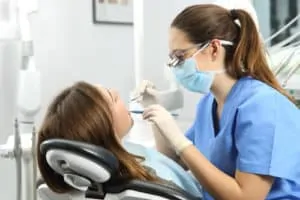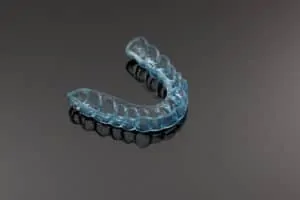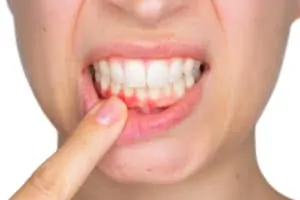
A Little Clench & Grind
During times of increased stress, we tend to subconsciously clench our teeth tightly together or grind them against each other. While this may seem like no big deal, if done repeatedly over a long period of time, grinding and clenching can cause damage to both the teeth as well as the jaw joint. Putting constant force on the teeth can lead to chipped, cracked, or fractured teeth, while habitually engaging jaw muscles may cause TMJ disorder. TMJ disorder can be painful and may lead to long term problems. So if you’re experiencing any popping, clicking, or locking in the jaw joint, we recommend contacting your Asheboro dentist.
Gum Disease
Usually we talk about gum disease being caused by an improper hygiene routine or missing regular visits with your dentist. However, recent research has also shown a positive link between stress and the development of gum disease. Gum disease is a serious condition that not only affects your mouth, but your whole body as well. If left untreated, gum disease can cause tooth loss, heart disease, and pregnancy complications, along with a host of other health problems.
Take It Easy for Health’s Sake
To help protect your body and oral health during the stressful holiday season, we encourage you find ways to help yourself relax. Check out the following tips for a few things to try.
- Breath it Out. Something as simple as setting aside a few moments to take a few deep breaths can really help lower stress. Practicing deep breathing exercises has been proven to lower blood pressure and reduce overall anxiety levels.
- Work it Out. Hit the gym, go for a walk, do some yoga. Whatever you choose to do, just get your heart pumping and sweat it out. Physical exercise can do wonders to decrease stress, and all the other health benefits don’t hurt either.
- Sleep it Off. It can be difficult to get enough sleep during non-crazy times of the year. And during the holidays it can be even harder. Remember to schedule in time to make sure you’re catching enough zzz’s. Giving your body a chance to relax can keep you healthy so you can actually enjoy everything the holidays have to offer.
From all of us at our Asheboro dental office, we hope you have a great holiday season with limited stress and anxiety and packed full of friends, family, laughs, and great memories.















